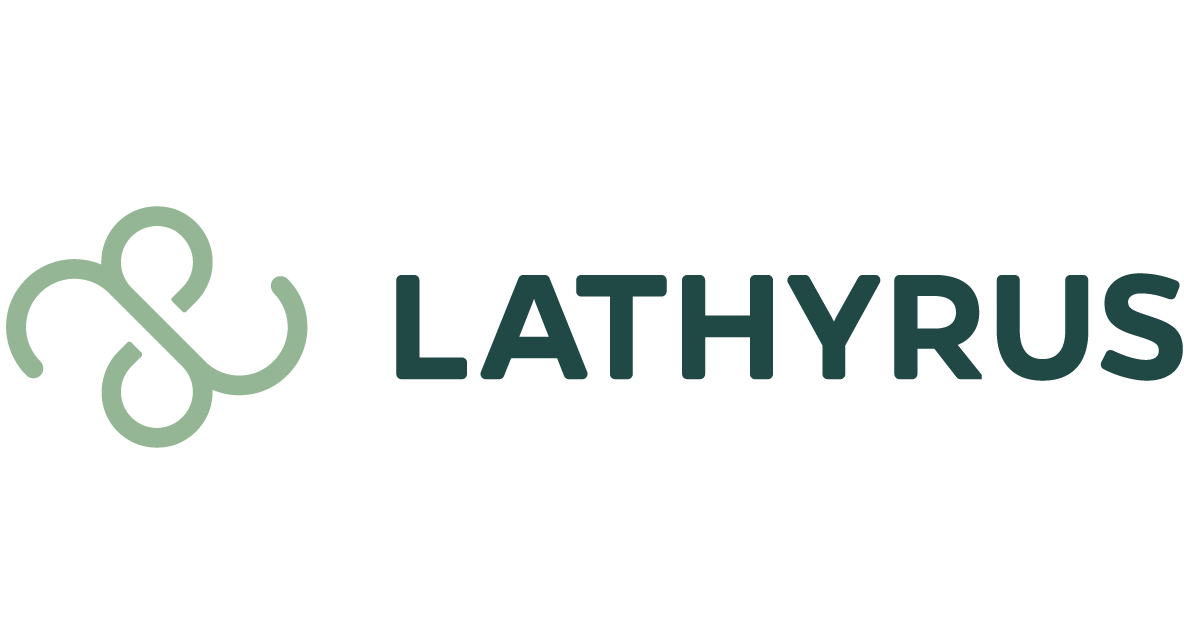The greatest and most persistent challenge I experienced in Malawi is encapsulated in the word, “karibu”. Since returning to Canada, I’ve been thinking about that challenge as it relates to COVID-19.
“Karibu” is a Swahili word, and Swahili is not widely spoken in Malawi. The literal English translation is “almost, close, beside, about to, close in, closely, closemouthed, close off, closer and close up.”1 But Malawians have adopted karibu in its colloquial form, as an invitation to someone to take some of whatever food you’re eating. (This is one of many examples of how there can be little or no relationship between knowing the literal translation of a word or sentence, and knowing its actual meaning — what makes learning a new language difficult.)
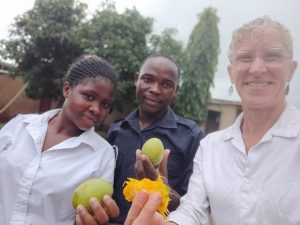
Veronica the cleaner, Peter the guard, and I share mangos from the tree at the CSONA office
“Karibu” is what someone says if I walk into a room and they’re all having lunch together, or if I approach a colleague to discuss something, and she’s eating a snack. And they mean it: I am welcome to take as much or as little food as I like.
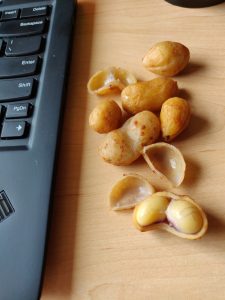
Bombara groundnuts: Yum!
Sometimes the response to Karibu is a polite decline, or to take a small sample. But that’s not always the case. Soon after I learn “Karibu”, I offer my groundnuts to a co-worker sitting beside me at our long work desk, and he takes half of them. “I’m like you,” he says. “I really like groundnuts.”
Outwardly, I maintain my composure, but inwardly, I am surprised to discover I am a dog at its food bowl. What just happened?
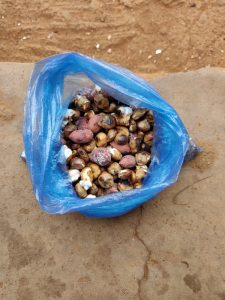
Roasted maize and groundnut street snack
It’s not that I’ve never shared food with anyone. I have. I’ve made meals for people, I’ve given food to people, I’ve even asked friends and family whether they wanted to taste something I had on my plate. I’ve happily given all of those things.
As I hear and use “Karibu”, I keep noticing my emotional responses. I’m quite happy to have others offer food to me, and they seem genuine in their generosity. Sometimes when I only take a small amount, they encourage me to take more, or to sit down and share the whole meal with them. I don’t sense the same stinginess in them that I notice in myself.
But when it comes to offering food to others, I find some disquieting internal barriers and defences.
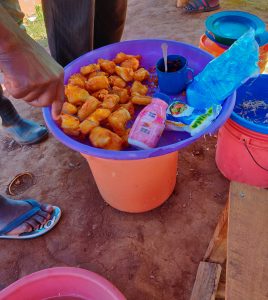
Chinangwa chokazinga: Deep-fried cassava (like vegan fish-and-chips all in one bite)
At Savanna Courtyard, I like to eat my meals, and especially breakfast, outside. But there are guards, gardeners, and maintenance men around the property, and I don’t want to offer them my food. I have three reasons (or rationalizations) for this:
First: There are several of them, and only one of me. Do I offer food to all of them? How would I fulfill that offer if they accepted? Would the assumption become that I am going to cook for them? That’s not where I want this to go.
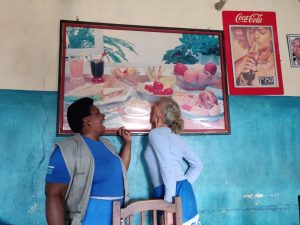
The food of my childhood
Second: Very occasionally, a guard has approached me directly (knocking on my door) or indirectly (making suggestions during conversation) asking me to give him money to pay for a relative’s school fees, or something similar — requests that I have always declined. If I start offering people food, will they be more likely to show up at my doorstep with more requests? Many of us volunteers have commiserated about how difficult it is to keep saying, “No” to people on the street multiple times a day. (“No, I don’t have a job for you. No, I don’t want to buy that. No, I’m not going to give you money. No, I can’t help you emigrate…”) Rejecting those requests feels painful; I don’t want to have to do that any more often than I already am.
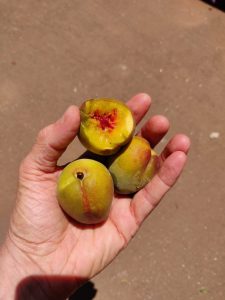
Peaches! They never got any bigger or riper than this.
Third: My home is not just my home. Savanna Courtyard is owned by an Indian-Malawian family, and I share my flat with a roommate. What would the landlords think about me inviting their employees into my home to eat with me during their work day? How would my roommate feel about having them in our home, with all our possessions? Thoughts like this conveniently relieve me of any sense of responsibility: It’s them, not me.
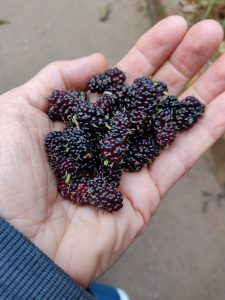
Mulberries picked and given to me by Gilbert, the night watchman
I find it takes an act of will for me to offer food to someone, when I’m not sure how we would share it (my bowl of porridge in the morning), or when I believe there’s a possibility they may take more than I want them to take. Why is that? I have so much—often more than I need—and yet I seem to find true generosity difficult.
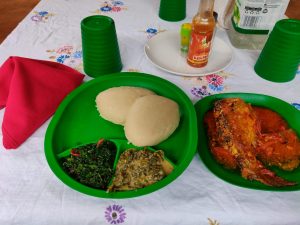
Clockwise from top: Nsima, butterfish, greens stewed with groundnuts, and plain greens. Note the lack of cutlery. This is all food eaten with the hands.
As I walk in the gate to Savanna Courtyard midday while the guards are eating their lunch, they call to me, “Karibu!” I join them, and even though I ate lunch a short time before, I sample the nsima, greens, and stewed soy pieces they’re eating. It tastes good! I stay a few minutes to chat and, encouraged by them, have a few more bites, compliment them on their cooking. It feels good to relax and visit together. When I ask whether I can take their photo, they’re delighted.
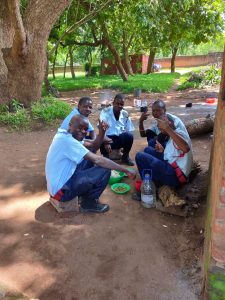
The guards encouraging me to come eat with them.
Towards the end of my stay in Malawi, I come across a proverb by the Fulani people of West Africa: “If you see a man in a gown eating with a man in rags, the food belongs to the latter.”
Ouch. I recognize the truth there.
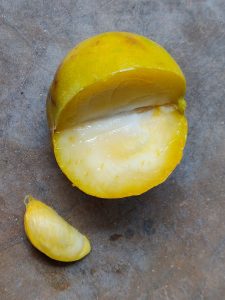
Matsuku, wild loquat, or sugar plum
My last morning in Malawi, two of the other volunteers and I ask the taxi driver, Willie, who is to take us to the airport, to first bring us to the home of the CARE International regional director who has been so welcoming to us, despite his many other responsibilities. Willie, a very lean young man, is going to wait in the car while we go inside to have coffee and tea with Matthew and his family.
It’s very early, still dark. I have food with me to eat on the plane, and I wonder whether Willie has eaten yet. I pull out a small bunch of my favourite apple bananas. They’re something one would rarely find in Canada, and I don’t know when I’ll ever get to eat them again. “Karibu?” I say to him, hoping he may only take two. He smiles gratefully, and takes the whole bunch. I notice my disappointment.
But I notice something else here, too. It’s just a glimmer, but there it is: a sense of connection. My brother. Tilitonse.
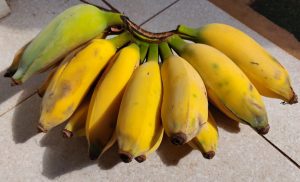
Apple bananas
~ * ~ * ~ * ~
I’m now 13 days into my 14-day self-quarantine, generously hosted by my sister-in-law and her husband at their home in Cambridge, Ontario. I find my thoughts returning daily to Malawi, a country that has just reported its first cases of coronavirus infection, and with a highly vulnerable population.
When traveling for work while I was there, I rarely found soap in the bathrooms or latrines. Hand towels or dryers are even rarer. Most families live in one or two room homes. All the people in a village pump their water from the same well. Social distancing? Self quarantine? It seems impossible.
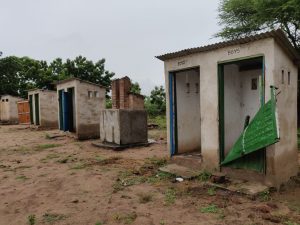
School pit toilets
The health care system is already inadequate. Two million people already experience food insecurity. One million adults have compromised immune systems, because they’re living with HIV/AIDS.
Malawi is only a small sample of a large portion of the world’s population that shares some or all of these characteristics. The urban poor and homeless in Canadian cities are at similar risk. These are the people we are NOT going to see or talk with online, which creates the additional challenge that for us they are mute and invisible. But they are still real.
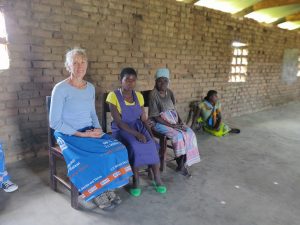
Guests of honour, seated on chairs in a village church, while everyone else sits on the floor
Yesterday, I was on a video conference call with fellow coaches in southern Africa, sharing our individual circumstances, reactions, and responses to COVID-19. South Africans are preparing for a three-week country-wide lockdown. Sibusisa, one of the other participants says, “We all need to acknowledge that the virus lives inside ourselves.”
When he says that, I think, “Yes.” And the virus is not just COVID-19, is it?
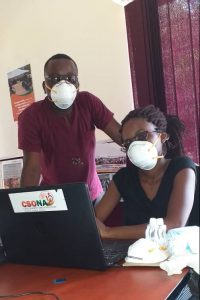
Danstan and Blessings get ready
When a vaccine does become available, who should be prioritized to receive it? Health care workers and food supply chain workers, of course. And then? As with everything else, do we first feed the wealthy?
Karibu.
Copyright © 2020 Lynn Thorsell, All rights reserved.
~ * ~ * ~ * ~
References
Brilliant, Larry. My wish: Help me stop pandemics. TED, February 2006.
Maurer, Bill. Emotional Currency: How money shapes human relationships. The Hidden Brain, NPR, 13 January 2020.
Walker, Patrick GT, Whittaker, Charles, et al. The global impact of COVID-19 and strategies for mitigation and suppression. Imperial College London, 26 March 2020
Footnotes
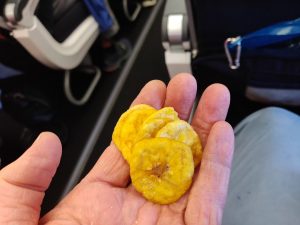
Plantain chips, freshly made in Ghana, and given to me by a fellow passenger to Toronto
~ * ~ * ~ * ~


